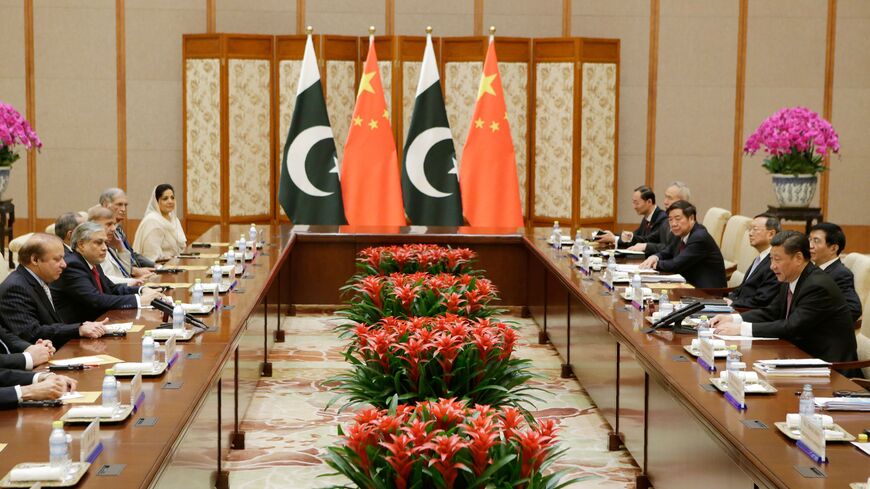Having agreed to exchange ambassadors and reopen their embassies within two months, bitter rivals Saudi Arabia and Iran issued a trilateral statement March 10 after a decisive round of talks facilitated by China. While the deal will have repercussions throughout the Middle East, another major player that stands to gain is Pakistan, Iran’s immediate neighbor and a close strategic ally of Riyadh.
Since breaking diplomatic ties in 2016, Iran and Saudi Arabia have remained on opposite sides of nearly every regional conflict, from Syria to Iraq to Yemen. Iraq and Oman had also worked to engage the two rivals, but it was Beijing that finally managed this geopolitical shift.
Pakistan attempted to resolve the regional rift as soon as it happened and continued mediation efforts over the years. Being home to the second largest Shiite population after Iran (though it is a majority Sunni state), Islamabad had to deal with religious and sectarian violence by extremist groups from both sides whenever the matter intensified.
"One of biggest winners" from deal
Adopting a nuanced approach, Islamabad tried to maintain balance in its dealings with both the countries. A statement by the Pakistan Foreign Office called the normalization an “important diplomatic breakthrough” made possible by “China’s visionary leadership.”
Michael Kugelman, South Asia Director at The Wilson Center in Washington told Al-Monitor that Pakistan would be one of the biggest winners if the deal works.
“Few countries are more vulnerable to Iran-Saudi Arabia rivalry than Pakistan. It has a military alliance with the Saudis, it borders Iran, it has a Shia population of 20%, it is pressured to help Saudi Arabia militarily, and it is periodically targeted by militants based in Iran," Kugelman said.
He added that Islamabad has sought to be neutral in the rivalry, but that its alliance with Saudi Arabia makes that difficult. "It's easier to be neutral--meaning to pursue warm relations with both countries--if Saudi Arabia and Iran get along well enough not to be overly bothered by Pakistan's good relations with both," the expert added.
Foreign Minister Bilawal Bhutto-Zardari has said that Pakistan is looking forward to participating in Belt and Road Initiative (#BRI) summit that is to take place in China this autumn. pic.twitter.com/camX4ahTIY
— The Daily CPEC (@TheDailyCPEC) March 17, 2023
Iranian Foreign Minister Hossein Amir-Abdollahian stated that the agreement provided “major” opportunities for “the two countries”, the region, and the Muslim world.”
Apparently, joint ventures between Iran, Saudi Arabia and Pakistan may be possible if the Chinese mediation efforts prove to be sustainable.
Having had dependable ties with neighbor China, Pakistan was one of the first participants of President Xi Jinping’s mega-project, the Belt and Road Initiative (BRI). In 2015, the China-Pakistan Economic Corridor (CPEC), flagship corridor of the BRI was launched. Ultimately worth around $65 billion, it is also the only corridor nearing completion from the six corridors of the BRI.
Nearly $26 billion have been invested by China up till now and the project has entered the second phase. Both Saudi Arabia and Iran were invited to join this trade connectivity project but their involvement remained negligible. With their bilateral differences set aside, both China and Pakistan can benefit as the two rivals can participate or invest in various CPEC projects.
As per Kugelman, “The sustainability of the deal is the fundamental issue at play. The key signpost will be whether each country changes, or at least adjusts, the policies that have most upset the other. In particular, would each side draw down their support for violent proxy groups that target the other, and the other's interests? For example, if we start seeing less Saudi and Iranian involvement in the war in Yemen, that would be a very strong and encouraging data point.”
Zeeshan Shah, a financial analyst at FINRA in Washington, told Al-Monitor, “Saudi pressure has reportedly been behind Pakistan’s calculation in not expanding trade with Iran and not completing the gas pipeline, on top of the nuclear sanctions on Iran.”
Shah added, “Pakistan’s external security had been under increased pressure from Riyadh to choose a side. The Iran-Saudi rivalry narrowed Pakistan’s economic and political maneuverability and reduced its strategic options.”
Much needed economic boost
Considering the economic crisis that Pakistan is going through due to political instability and catastrophic flooding, Islamabad would welcome a rapid increase in cross-border trade with Iran and investment from the Kingdom, along with possible joint ventures with Tehran and Riyadh,
However, a European diplomat posted in Islamabad told Al-Monitor on condition of anonymity that this development would help Pakistan only in the medium to long term unless sanctions on Iran are lifted.
Highlighting some advantages, he added that reduced regional tensions can reduce the recruitment capacity of jihadi groups, and Pakistan can avoid being entangled "in the zero-sum game of the two regional rivals.”
Beijing stands to be the main beneficiary, since it already had long-term comprehensive strategic partnerships with Tehran as well as Riyadh. Since Beijing had to meticulously balance both the allies, ending their differences may have become necessary. Trying to maintain the positive tempo, China now plans to host an Iran-GCC summit soon.
Meanwhile, China is the largest trading partner of both the rivals, representing almost 30% of Iran’s total international trade, and Saudi Arabia’s largest oil export market with bilateral trade up 33.1% on a yearly basis.
At the Financial Sector Conference in Riyadh, Saudi Finance Minister Mohammed Al-Jadaan mentioned that Saudi investments into Iran can happen “very quickly” after the agreement to restore diplomatic ties.
In another fresh development, the Export-Import Bank of China announced that it would provide Saudi National Bank loan cooperation in yuan. Dong Dengxin, director of the Finance and Securities Institute of the Wuhan University of Science and Technology, stated that this facilitation could become a “good template” for deals with other countries. Apparently, Tehran and Beijing have also discussed increasing yuan-based trade.
Most of all, Beijing can now accelerate its mega-connectivity project, the Belt and Road Initiative. In addition, Riyadh can join the China-led Shanghai Cooperation Organization, of which Iran is also a member.
Nevertheless, many details remain unresolved. Soon after the announcement, Saudi Foreign Minister Prince Faisal bin Farhan said, “It does not mean that an agreement has been reached to resolve all pending disputes.”
Hard-line segments of Iranian army or establishment could have some objections. The truce also may have no immediate impact on the Yemen war, as the Houthis have made it clear that they are not subordinate to Tehran.
According to the diplomat, “There is a high degree of symbolism due to the involvement of Beijing, though only in the last phase of the talks. It was a remarkable achievement as the two old rivals reached the conclusion that as the old saying goes: ‘you can eat soup with your enemy, though with a longer spoon.’”
In the past, Beijing restricted itself to being just an economic partner and investor in the Middle East. Being directly involved with this agreement, China may also have to play the role of a guarantor and accept responsibility for the actions of both its allies and possibly even maintain the peace in the oil-rich volatile region.








